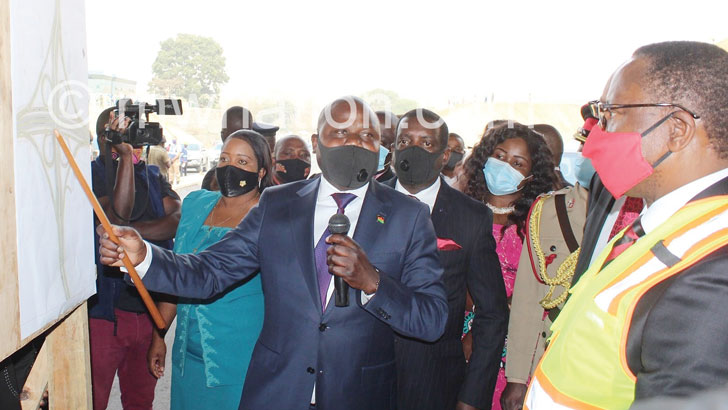Eyebrows on K52bn claim
Players in the road construction industry say government can avoid paying billions of kwacha in arrears and interests to contractors by awarding contracts when funds are available.
Roads Fund Authority (RFA) board chairperson Joe Ching’ani and National Construction Industry Council (NCIC) chief executive officer Linda Phiri were reacting to a Mota-Engil’s K52.9 billion claim to government which the National Audit Office (NAO) is disputing.
The two observed in separate interviews this week that apart from flouting procurement laws, embarking on road projects before assurance of availability of funds has a huge bearing on the economy.
According to a letter from NAO to Secretary to Treasury, dated January 27 2021 Weekend Nation has seen, the audit office conducted a verification exercise on the claim that Mota-Engil says was being owed as at November 20 2020.
NAO reviewed contract agreements, interim payment certificates (IPCs) and payment vouchers. The office also conducted interviews and reviewed documentation to get clarification and understanding on how arrears and interest claims were calculated.

Area 18 Interchange by Mota-Engil
Among other things, NAO found that the contractor claimed euro 20 713 205 and $268 381 on interest and donor-funded projects.
The office is also disputing a claim of K3.9 billion, which it says was related to projects that were donor-funded, or whose IPCs were disputed or were not submitted to RFA.
According to NAO, RFA disputed K27.5 billion which, among other things, is claimed as interest payment because it is charged in foreign currency as opposed to the Malawi kwacha or using a different rate than what was agreed in the contract agreement.
NAO also disputes a claim of K1.56 billion on works that were not completed satisfactorily and K5.6 billion because the amount includes a charge on idle time on machinery, which were not in the contract agreement.
According to the letter, the physical verification also revealed that works were behind schedule and had stalled on some roads despite the contractors being paid more than the agreed percentage of contract price.
Ching’ani observed that unfinished projects and accumulation of payment arrears and interests arise from government’s failure to adhere to the Public Procurement and Disposal of Assets Authority (PPDAA) law on award of contracts and the Public Finance Management Act (PFMA).
“The PPDAA law as stipulated in Clause 26 (2a) tasks the internal procurement and disposal committee to, “ascertain the availability of funds to pay for any procurement before awarding a contract”.
But public officials do not comply with these legislations, said Ching’ani. “The proper way is never to award any contract for a road project or only do so when financial resources have been ascertained, in tandem with the PPDAA and the Public Finance Management Act,” he said.
On her part, Phiri observed that NCIC has for years been engaging government on the same concerns but nothing has been done.
She explained that when government withholds income all stakeholders are suffocated starting with the contractors, banks, government and the economy as a whole.
“How do you expect a contractor to perform when he has not been paid for 10 years? Government should only embark on a project when money is available because sometimes taxpayers pay three times the original cost,” said Phiri.
She also gave an example of the one percent levy government is supposed to remit to NCIC from clients to enable it to play its regulatory role of monitoring compliance of standards by building contractors.
She said NCIC is currently unable to adequately do this due to lack of funds.
Phiri said government owes contractors billions of kwacha in arrears and failure to pay them consequently means NCIC cannot receive the levy.
In November last year, former minister of Transport Sidik Mia said government owed contractors over K79 billion.
But Ching’ani and Phiri observed that such claims would not arise if there were no delays in paying contractors.
NAO assistant spokesperson Carol Buliyani, in a telephone interview last week, explained that the verification exercise was not complete and Mota Engil will be asked to produce evidence on some of the claims it has made.
Ministry of Finance spokesperson Williams Banda indicated that government will only pay what the Auditor General has verified and not what the contractor is claiming.
When asked on government’s non-compliance with the PPDAA law by proceeding with procurement without ascertaining availability of funds, Banda said Ministry of Transport or Roads Fund (RF) were better placed to comment.
Ministry of Transport spokesperson Andrew Mthiko said his ministry works closely with the Ministry of Economic Planning and Development which scrutinises all annual road programmes through the Public Sector Investment Programme (PSIP).
He said: “The Ministry of Finance then confirms availability of funding for the projects. The funding is then subjected to approval by Parliament.”
Mthiko said once Parliament has approved the budget, the ministry, through the RA, commences the procurement of consultants to come up with a feasibility study and engineering designs then procurement processes for the contractors follow.
He said at each stage of procurement of the consultant or contractor, the ministry seeks clearance from PPDAA before a contract for design or construction is signed.
Mthiko added that the budget approved by Parliament projects the inflow of revenue that will finance the planned road projects but this can be affected by the collection of revenue.
A former minister of transport confirmed that there is always pressure to deliver on the development side without considering the monetary aspect of it.
He said: “Contractors with big capital are the ones benefitting from such projects because they sign a contract and immediately start construction works before the standard 20 percent payment, and may be issued with certificates at every 20 percent stage.”
He observed that the amount that government pays at the end in accumulated arrears and interests is huge—sometimes double the original cost of the project.
Mota-Engil public relations officer Thomas Chafunya said his organisation will not comment on NAO findings until it gets official communication.





